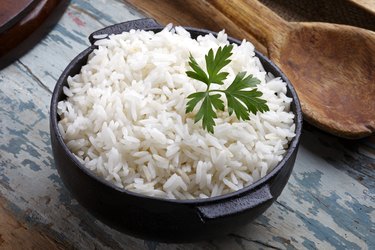
With more than 40,000 different types of rice, it's hard to limit yourself to just long-grain rice. Both jasmine rice and basmati rice — available in white or brown — are aromatic rices with a nutty flavor that make a nice alternative to your usual side dish.
Both jasmine and basmati rice are high in carbs and low in fat. But there are slight differences in nutrition — such as fiber content — between the two types of rice.
Video of the Day
Video of the Day
Read more: How is White Rice Healthy for Our Body?
Compare Calorie Content
The calorie content of jasmine and basmati rice are quite similar, even when it comes to choosing white or brown. A 1/4-cup serving of dry white jasmine rice, which yields 3/4 cup of cooked rice, contains 160 calories, and the same serving of brown jasmine rice contains the same amount of calories, according to the USDA.
A 1/4-cup serving of dry white basmati rice contains 160 calories, and the brown basmati rice contains 10 calories according to the USDA. While the brown basmati rice is a slightly higher-calorie option, as a whole grain, it makes a healthier choice.
Consider the Macronutrients
A 1/4-cup serving of dry white jasmine rice contains:
- 35 grams of carbs
- 3 grams of protein
- 0 grams of fat
The same serving of brown jasmine rice contains:
- 35 grams of carbs
- 2 grams of fiber
- 3 grams of protein
- 1 gram of fat
A 1/4 cup serving of white basmati rice contains:
- 35 grams of carbs
- 4 grams of protein
- 0 grams of fat
The same serving of brown basmati rice contains:
- 40 grams of carbs
- 4 grams of fiber
- 5 grams of protein
- 1.5 grams of fat
When it comes to better nutrition, the brown rice version of either of the two rices makes a healthier choice because of the fiber content. Getting more fiber in your diet improves meal satiety, which helps with weight control.
Includes Some Iron
Iron deficiency is a major health concern, according to the Office of Dietary Supplements, and not getting enough iron in the diet can lead to anemia. Adult males need 8 milligrams per day, while adult females need 18 milligrams. Although not significant sources of iron, some versions of jasmine and basmati rice can help you meet your daily needs.
Brown jasmine rice and white basmati rice both meet 2 percent of the daily value per serving. Brown basmati rice provides 6 percent, and white jasmine rice provides 10 percent of daily iron needs, according to the USDA.
Read more: Which Rice is Healthiest for Consumption?
Save on Salt
Jasmine and basmati rice are naturally sodium free, at 0 milligrams per serving. Most Americans get way too much sodium in their diet — 3,400 milligrams according to the American Heart Association.
The maximum daily intake of sodium should not exceed 2,300 milligrams — but, ideally, no more than 1,500 milligrams. Excessive sodium intake can increase the risk of high blood pressure and heart disease, according to the Centers for Disease Control and Prevention.
- Office of Dietary Supplements: "Iron"
- American Heart Association: "How Much Sodium Should I Eat per Day?"
- USDA FoodData Central: "Basmati White Rice"
- USDA FoodData Central: "Brown Basmati Rice"
- USDA FoodData Central: "White Jasmine Rice"
- USDA FoodData Central: "Brown Jasmine Rice"
- Centers for Disease Control and Prevention: "Get the Facts: Sodium and the Dietary Guidelines"
Was this article helpful?
150 Characters Max
0/150
Thank you for sharing!
Thank you for your feedback!